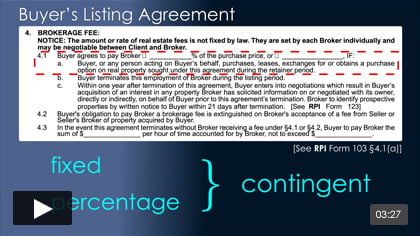Foreclosure
Bidder at trustee’s sale liable for bid after stopping payment on cashier’s checks
Reported by Bradley Markano
A buyer was the highest bidder on real estate at a trustee’s foreclosure sale. The buyer paid the bid by endorsing and delivering cashier’s checks to the trustee. The trustee deposited the cashier’s checks, but before the bank issuing the checks delivered the funds to the trustee for disbursement to the foreclosing beneficiary, the buyer handed the bank his declaration that the cashier’s checks had been lost without being endorsed. The beneficiary made a demand on the buyer for the amount of the bid at the trustees sale, claiming the buyer was liable for the price bid since the declaration of the bank which stopped payment of the cashier’s checks already received in payment of the price bid was fraudulent and felonious conduct without the antideficiency protection provided by the trustee’s foreclosure law. The buyer claimed the beneficiary was barred by antideficiency law from enforcing the bid since his only remedy for failure of payment was to re-notice the trustee’s sale and recover the costs of re-noticing and holding another trustee’s sale. A California appeals court held the buyer was liable for the amount of his high bid at the trustee’s sale since the bank had been induced to stop payment on the cashier’s checks by the buyer’s wrongful conduct, which had in turn interfered with the immediate availability of funds to the trustee receiving them on behalf of the beneficiary.
Also at issue in this case:
Election of remedies for judicial foreclosure is only viable for parties affected by original foreclosure judgment
A property under a trust deed received a judgment for judicial foreclosure. Later, interest in the foreclosed property was transferred to a trustee, who sold the property in nonjudicial foreclosure through a trustee’s sale. The buyer purchased the property and endorsed several cashier’s checks to the trustee as payment. The trustee deposited the cashier’s checks, but before the bank issuing the checks delivered the funds to the trustee for disbursement to the foreclosing beneficiary, the buyer handed the bank his declaration that the cashier’s checks had been lost without being endorsed. The beneficiary made a demand on the buyer for the amount of the bid at the trustee’s sale, claiming the buyer was liable for the price bid since the declaration of the bank which stopped payment of the cashier’s checks already received in payment of the price bid was fraudulent and felonious conduct without the antideficiency protection provided by the trustee’s foreclosure law. The buyer claimed the election of remedies doctrine barred the beneficiary from enforcing the sale since the property had been sold in a trustee’s sale in spite of the judgment of judicial foreclosure previously placed upon it. A California appeals court held the buyer was ineligible to benefit from the doctrine of election of remedies since the buyer was neither a trustee nor debtor under the trust deed pertaining to the property and thus his purchase had not been influenced by the nonjudicial foreclosure decision. [California Golf LLC v. Cooper (June 9, 2008)163 CA4th 1053]
Property disclosures
Seller must disclose prior lawsuits to buyer
Reported by Bradley Markano
A buyer purchased a condominium unit in a structure with underground parking. Water had previously seeped into the parking area during rainstorms, leading to a lawsuit against the builder by the homeowner’s association (HOA). The builder settled with the HOA for significantly less than the estimated cost to fully repair the garage, and the HOA used the settlement money to patch the defects. Prior to close of escrow, the seller submitted a transfer disclosure statement (TDS) to the buyer which stated the defects had been repaired but did not mention the prior lawsuit. After close of escrow, water continued to enter the underground parking area diminishing the market value of the unit to below the price paid by the buyer. The buyer sought to recover his loss of value due to the defective structure, claiming the seller’s failure to disclose the previous lawsuit made the seller liable for his loss since the lawsuit was evidence of a defect or deficiency in the property. The seller claimed the TDS fulfilled his duty to inform the buyer since he had disclosed his knowledge about the defect. A California appeals court held the seller was liable for the devaluation of the buyer’s unit since the seller failed to disclose information which was readily available and would have allowed the buyer to independently investigate the nature of the defects and the extent of the repairs at the time of the sale. [Calemine v. Samuelson (February 17, 2009)__CA4th___]
RESPA
Administrative fee surcharge on top of percentage fee for brokerage services violates RESPA
Reported by Ai M. Kelley
A prospective buyer entered into a listing agreement with a selling broker. The brokerage fee agreed to for finding a suitable property for the buyer was comprised of a basic percentage fee and an administrative surcharge of a fixed-dollar amount. The broker found the buyer a suitable one-to-four unit residential property and a federally related mortgage loan was obtained. On closing, the buyer refused to pay the surcharge fee, claiming it violated the Real Estate Settlement Procedures Act (RESPA) regulation regarding “no-new-service, no-second-fee” on sales of single family residences financed by federally related mortgages since the surcharge was a duplicate charge for services already covered by the basic-percentage brokerage fee and no additional beneficial service was provided in exchange for the surcharge. The broker claimed the administrative fee did not violate RESPA’s “no-new-service, no-second-fee” regulation since the agreed-to fee was part of the total compensation package due the broker for all of the brokerage services provided, and thus constituted an “earned fee” under RESPA. A federal district court held the administrative fee to be in violation of RESPA’s “no-new-service, no-second-fee” regulation since no additional beneficial settlement service was provided beyond those basic services provided to locate a property in compensation for payment of the basic-percentage fee. [Busby v. JRHBW Realty, Inc. (April 20, 2009) __ F.Supp __]
Editor’s note: A simple increase in the amount of the percentage fee would have avoided having to go to court in the first place and be nailed with tens of millions of dollars in penalties. However, the increased percentage fee might not have appeared competitive and could well have driven them out of business for that reason.
Subdivisions
Agreement to purchase an unmapped parcel is void due to waiver-of-map provision
Reported by Bradley Markano
A buyer and a seller entered into a purchase agreement for the transfer of a portion of a larger parcel, intending to record a final map to conform to subdivision laws. The purchase agreement further provided for the buyer to waive the requirement of a recorded map at closing. Before the close of escrow, the seller refused to perform on the purchase agreement, claiming it was void since it authorized the sale of a portion of a parcel without requiring the recording a parcel map describing the portion to be conveyed. The buyer demanded the seller close escrow under the purchase agreement, claiming the buyer’s rightto waive the recording of a parcel map so the portion conveyed would comply with the subdivision law did not invalidate the purchase agreement since the parcel map requirement was solely for the buyer’s benefit, a condition which allowed the buyer to waive the contingency. A California appeals court held the purchase agreement was for the transfer of an unsubdivided portion of a larger parcel and was void when entered into since it contained a provision which permitted the buyer to waive the recording of a map subdividing the larger parcel to create a legal parcel describing the property being purchased. [Sixells LLC v. Cannery Business Park (December 29, 2008)___CA4th__]
Title insurance
Transfer of ownership from LLC to its members extinguishes title insurance policy
Reported by Bradley Markano
A CLTA policy of title insurance covered a limited liability company’s (LLC’s) ownership of a property and the ownership interest of any successors who acquired ownership by operation of law. Coverage was to be terminated by any voluntary transfer, unless an endorsement to the policy was obtained. The LLC later transferred ownership of the property to members who held interests in the LLC. A later dispute with a neighbor over an easement led to a lawsuit. After the lawsuit was settled, the insurer refused to cover thetrial costs, claiming the title insurance policy was terminated by the grant deed transferring title from the LLC to the its members since the transfer was a voluntary act, not one accomplished by operation of law. The members now in title sought to require payment and recover their money losses from the insurer, claiming the insurance policy remained effective since, as the former sole members of the LLC, only the method of holding title had changed while no change in proportional beneficial interest occurred. A California appeals court held the CLTA policy of title insurance had been terminated by its terms of coverage since the transfer of ownership was voluntary and had not been accomplished by operation of law and an endorsement covering the new vesting had not been purchased. [Kwok v. Transnation Title Insurance Company___CA4th__]


















